
Critical thinking skills, critical in times of COVID-19
Lack of media literacy and critical thinking is an old problem in the new normal.
The instructions would follow with: “Today’s topic: A spring day in my city.”
Luckily, there are civil society initiatives that are working to address shortcomings of the education system in Kosovo.

Liridona Osmanaj
Liridona Osmanaj tries to do these three things every day: become a better person, make the community around her better, and motivate others to do the same. She recently graduated from Duke University with a master’s degree in international development policy. An avid activist with cross-sector experience, she diligently initiates and engages in community initiatives aiming for quality education, youth empowerment, gender equality, conflict transformation, good governance and using business for good.
This story was originally written in English.